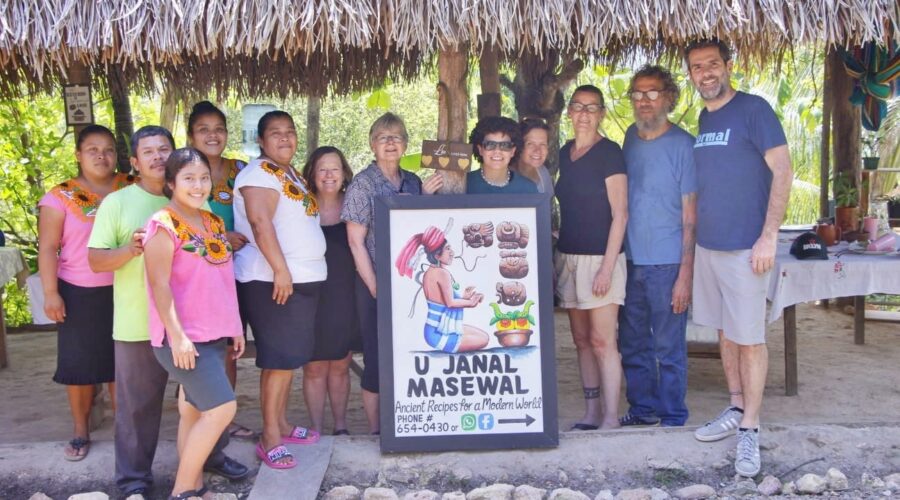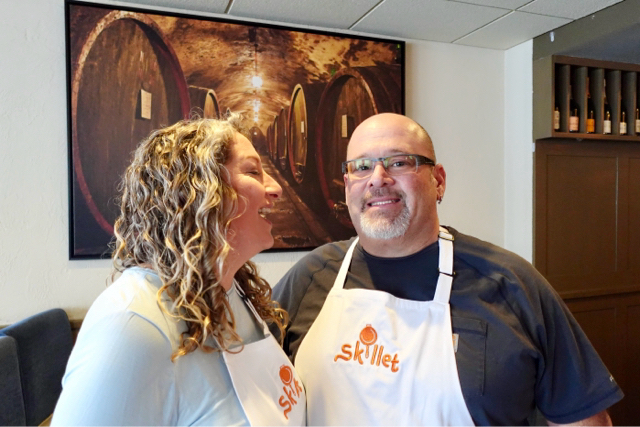
Exploring Cultures Through Family Home Cooking Classes
by guest author, Rachel Forrest.
I’ve been in classroom kitchens for lessons from the best chefs in the US, made pasta from scratch in an NYC restaurant kitchen and mixed up fancy drinks at Austin’s craftiest craft cocktail bar, but it wasn’t until I moved to Belize that I understood the importance of family home classes, of learning about my neighbors through the gift of their culinary traditions.
Near where I live in western Belize is Oxmul Kah, the Yucatec Maya name for San Antonio village where 3,000 people, the majority of Maya descent, live in the shadow of Caracol, one of the most important ancient Maya cities in Central America.
All over the country, a new generation of Maya in Yucatec, Mopan and Kʼicheʼ communities are part of a growing movement to preserve Maya culture for future generations through language, artisanal crafts and of course, cooking.
It’s in the heart of Oxmul Kah that U Janal Masewal, a Maya cooking experience hosted by the Tzib family, helps visitors learn to create delicious dishes rooted in thousands of years of Maya history, made with ingredients grown and raised in the village.
I bring anyone who comes to visit us to the class, to cook and enjoy the Tzib’s “ancient recipes for a modern world.”
On a recent visit, my aunt, cousins, husband and I gathered under the family’s thatch-roofed palapa near the warmth of their fogon, the traditional Maya stone and clay hearth.
On the table in front of us, a bowl of masa covered in brightly colored cloth soon to be worked into small corn tortillas. Chicken sizzled in a hot pan fired up on the fogon and we shredded coco yam for crunchy fritters while Salomon Tzib heated banana leaves over a fire which will be used to wrap the dough for the bollos later on.
Just about the entire family pitches in to create the experience, including parents Salomon and Patricia as well as daughters Miriam, Nelsy and Clarita.
Grandkids and dogs run around playing and sons Abdon and Frank, who also teaches Maya hieroglyph writing are often here, too, helping visitors understand the context of what we’ll make in the kitchen.
The brothers are community leaders,.an important part of that growing number of Maya eager to preserve the traditions and language of their ancestors.
While the chicken cooks, we make bollos, aka tamales from another waiting supply of masa, mixing it with chaya, forming the dough into balls before wrapping them in the banana leaves to steam in a pan on the fogon.
While they cook, Patricia takes the tortilla dough from the bowl, rolls a portion into a smaller ball and rapidly forms it into a perfectly round tortilla, spinning the circle with her fingertips. It’s our turn next and after a few tries, it’s obvious we all need a lot of practice.
Eventually, the tortillas pile up, some a bit more misshapen than others.
I’ve experienced many cooking classes over the years in part due to my career as a food writer but also because it’s both a fun experience and something I can take home with me to expand on in my own kitchen.
I’ve been in classroom kitchens for lessons from the best chefs in the US, made pasta from scratch in an NYC restaurant kitchen and mixed up fancy drinks at Austin’s craftiest craft cocktail bar, but it wasn’t until I moved to Belize that I understood the importance of family home classes, of learning about my neighbors through the gift of their culinary traditions.
Now, I’ve experienced traditional Mopan Maya cooking in the San Felipe village home of Eusebia Bo, making the masa from scratch by scraping off the corn kernels from the cob and learning the process of nixtamalization.
I tried my hand at making chocolate on a molcajete at nearby Ixcacao Maya Belizean Chocolate where the Cho family grows and processes cacao as well as offers a traditional meal.
I’ve climbed through the jungle with Eladio Pop, one of the nation’s most revered Maya forest gardeners, learning how cacao and other foods for the Maya table grow and have had a lesson in foraging from Narciso Torres, another forest gardener near where I live.
Just outside San Antonio is Oxmul Coffee where the Mesh family grows and processes coffee, welcoming visitors into their home to turn the crank on the metal barrel holding beans roasting over on a flame.
With all of these experiences, the phrase “food is love” rings so very true and passing on food traditions is a family “thing” no matter what the culture.
So often when we travel, we check off experiences as if they’re a list of conquests — “I’m going to ‘do’ the Empire State Building, see a show on Broadway, hit Serendipity for hot chocolate.”
It happens in Belize as well — “I’m ‘doing’ ATM cave, swimming with sharks, climbing the Xunantunich temple”– all wonderful, all important, but it’s also crucial to at least begin to understand the origins, legacy and culture of the people who live where we travel and cooking classes are one way we can make that connection.
Cooking classes and culinary experiences are a wonderful way to see a bit about how people live, to ask questions and accept the gift of their delicious food.
It’s thrilling to think that just below our feet are likely artifacts and even buildings, remnants of the “suburbs” of the great city of Caracol and another site, Pacbitun.
Also nearby are the San Antonio Women’s Cooperative, offering cooking classes and crafting experiences and Upe Nai with a Maya kitchen, birding walk and butterfly farm, all helping tourists and locals alike — including village school kids — to understand the cultural and natural beauty of the Maya world.
When the chicken is done, we shred it with a fork, creating a dry escabeche, then place it on our tortillas with some pickled onions.
The bollos come out of the steamer and the crisp fried fritters are skimmed out of the hot oil. Because it’s Belize, there’s plenty of hot sauce on the table and fresh fruit juice to pair with our meal.
Frank helps us decipher some of the hieroglyphs and we chat about history and plans for the future while enjoying the gift of this food, experiencing a feeling of community we can take with us, and a better understanding of the culture of even more people who share the same planet.
Rachel Forrest is a freelance food and features journalist living in Belize. She is the co-author of “Maine Classics: More than 150 Delicious Recipes from Down East” with James Beard Award-winning chefs Mark Gaier and Clark Frasier. Upcoming projects include “This Belizean Life,” a compilation of stories about her friends and neighbors. Find her work and check in for updates at www.rachel-forrest.com.

